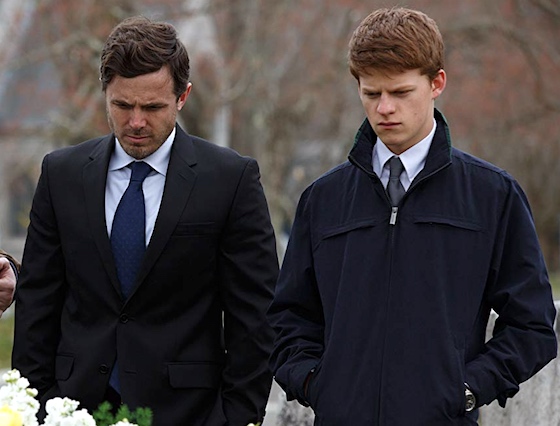Kenneth Lonergan | 137 mins | streaming (HD) | 1.85:1 | USA / English | 15 / R

One of the frontrunners of the 2016-17 awards season, Manchester by the Sea centres around Lee (Casey Affleck), a taciturn sort who’s called back to the eponymous hometown (which he’d left behind for reasons that are initially kept a mystery to us viewers) when his brother dies, naming Lee as the guardian of his teenage son (Lucas Hedges). As Lee attempts to figure out his new role, he’s plagued by the memories and emotions from why he left Manchester in the first place.
Manchester by the Sea is not a plot-driven movie. Even the mystery I alluded to above doesn’t play by ‘the rules’, with the answers being revealed about halfway through rather than near the end. There’s still a story, obviously (see above), but it’s more of a character study about people coping with grief — not in the wailing, all-consuming way you might typically associate with grief being depicted on screen, but in a more subdued, naturalistic manner. In harmony with that, there’s an element to it which is, not irreverent, but certainly mundane — like making calls to funeral directors over breakfast, for instance — and scattered with darkly comic realities, like paramedics struggling to get a bed into an ambulance. Indeed, for a film about such grim subjects, it’s surprisingly funny. But, as I’ve said in many reviews before, that’s life: the world is still funny, and we often still laugh, even when tragedy is all around.

Given all that, it’s not surprising it was Casey Affleck’s performance that attracted most attention and won most of the awards. That’s not undeserved — he’s the core of the film, and it’s a powerful but understated performance — but Lucas Hedges is also brilliant in a part that could’ve been given short shrift. In fairness, if we’re talking about awards, he got plenty of nominations too. So too Michelle Williams, playing Lee’s ex-wife. She’s not bad, but her awards recognition is all really for that one scene — you know, the one they always played as the film’s clip, and that’s alluded to on the poster. Indeed, it’s interesting how prominent she is in the marketing — her role is central to the state Lee’s in, but the actress herself isn’t on screen very much. Her absence is more felt than her presence, even.
It’s understandable that one scene became such a focus — it’s a powerful moment of great importance to the characters (and, more cynically, is virtually the only major sequence with the two name lead actors). In some respects, however, I think the film’s most powerful moment comes at the other end of the film’s timeline: when we learn about what happened in the past, it ends with ‘the morning after’, when Lee faces what he has done and looks for the punishment he feels he deserves; instead he finds only understanding, so he attempts to punish himself. (This scene also got a fair bit of awards play, but lacked context. Or perhaps that was just me? I didn’t really get what was going on until i saw it in the film proper.) That’s a key part of what’s going on with his character, I think: he hasn’t just been trying to escape what happened, he’s also punishing himself. Other people aren’t always so understanding — some do judge him; one person quietly refuses to employ him, presumably because of what happened — but no one judges him as harshly as he judges himself.

An aspect I don’t recall being remarked upon much was the cinematography, but I thought it was a surprisingly good-looking film. DP Jody Lee Lipes’ work here isn’t flashy, maintaining the understated and naturalistic tone of the entire movie, but it’s very crisp, befitting both the freezing cold weather and raw emotions. On the other hand, if I had one criticism to level it might be that the film’s too long. Its events and emotions unfold at a measured pace, which is fine, but some of what we see is less necessary than the film seems to think it is (for one example, the opening sequence, where we watch Lee as he does various day-to-day janitorial jobs, feels like it goes on for ages and contributes little).
But I’m nitpicking at this point, really. Manchester by the Sea derives itself from such everyday moments, accumulating them into a subtle, realistic, quietly powerful character portrait.

